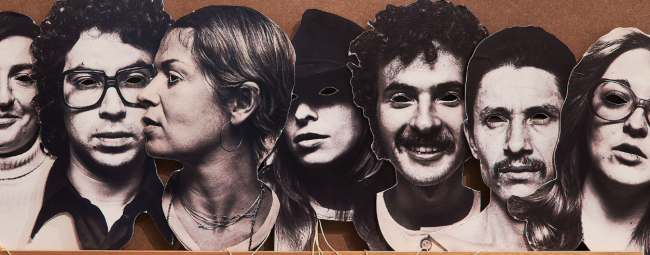Descripción de la Exposición
“El potencial de la escultura” es la primera muestra individual de Helen Escobedo en Proyectos Monclova y la segunda desde su retrospectiva titulada “A Escala Humana” en el Museo de Arte Moderno, Ciudad de México, en el 2010. La presente exposición está compuesta por una selección de 75 piezas de diferentes cuerpos de obra interrelacionados: dibujo, collage, escultura, escultura propositiva (maquetas) y pintura, y está centrada en los vínculos entre arte y arquitectura, diseño y espacios públicos, una de las constantes que marcaron la trayectoria artística de Helen Escobedo desde mediados de los 60.
La muestra abarca su periodo de producción desde finales de los 60 hasta principios de los 80, mostrando una línea de trabajo e investigación profunda, coherente y continua acerca de la escultura y su relación con el medio ambiente. La especificidad de sitio, una de las principales preocupaciones y pilares del trabajo de Helen Escobedo, parte de la voluntad de integrar el arte a la vida y a las actividades cotidianas, lo cual deriva en la vinculación de su trabajo con lo funcional.
Escobedo era una excelente dibujante y sus proyectos utópicos e instalaciones manifestados en dibujos y collages, introducían muchas veces un objeto subversivo, un comentario crítico y humorístico sobre el paisaje urbano. El dibujo era el soporte de elección para desarrollar ideas de proyectos más ambiciosos. En esos diseños construyó imágenes complejas, indispensables para entender su trabajo, particularmente su intención de transgredir prácticas artísticas establecidas e interesarse por los procesos, más que en los objetos terminados.
______________________
The Potential of Sculpture is Helen Escobedo's first solo show at Proyectos Monclova and the second since her retrospective titled A Escala Humana at the Museum of Modern Art, Mexico City, in 2010. The present exhibition is composed by a selection of 75 historic pieces of different interrelated bodies of work: drawing, collage, sculpture, maquette and painting, and is focused on the links between art and public space, landscape, architecure and design, one of the constants that marked the artistic career of Helen Escobedo since the mid-1960s.
The exhibition covers her production period from the end of the 60s to the beginning of the 80s, showing a line of deep, coherent and continuous research into the possibilities of sculpture and monument in relation to its environment. Site specificity, one of the main concerns and pillars of Helen Escobedo's work, was part of her intention to integrate art into life and daily activities, which allowed for a link between her work and the everyday.
Escobedo was an excellent draftswoman and her utopian projects and installations manifested in drawings and collages that often introduced a subversive object as a critical and humorous commentary on the urban space. Drawing was her medium of choice to develop ideas for ambitious projects. In those sketches she conceived complex images, indispensable to understand her work—particularly her intention to subvert established artistic practices, her will for experimentation—and her interest in processes, rather than in finished objects.
Helen Escobedo (1934–2010) studied at the Royal College of Art, London (1951–54). Among her most prominent public works are: Signals (1971), in Auckland, New Zealand; Doors to the Wind (1968), Friendship Route, in Mexico City; Cóatl, (1980), in the Sculptural Space, Mexico City; and The Sculptural Space Center (co-authorship) in the central campus of the UNAM, Mexico City, being one of the few women in the world making land art in the 70s. As a cultural promotor she was in charge of the management of MUCA, UNAM (1958–82) and the Museum of Modern Art (1983–85) in Mexico City. Escobedo received the award from the Royal Academy of Sciences, Literature and Fine Arts of Belgium (1986), the Guggenheim Fellowship (1991) and the National Arts Award in Mexico, within the category of Fine Arts (2009). The artistic work of Escobedo has been shown in 35 individual exhibitions and over 100 collective exhibitions in Mexico and abroad.

Actualidad, 19 feb de 2019
#loquehayquever en México: las propuestas expositivas de la Semana del Arte
Por PAULA ALONSO POZA
MUAC, Museo Amparo, MARCO, CENART, Centro Cultural Border y MUCH son algunos de los espacios institucionales que se han sumado al programa paralelo de la Semana del Arte. Hay muestras internacionales, de ...

Formación. 08 may de 2025 - 17 may de 2025 / Museo Nacional Centro de Arte Reina Sofía (MNCARS) / Madrid, España